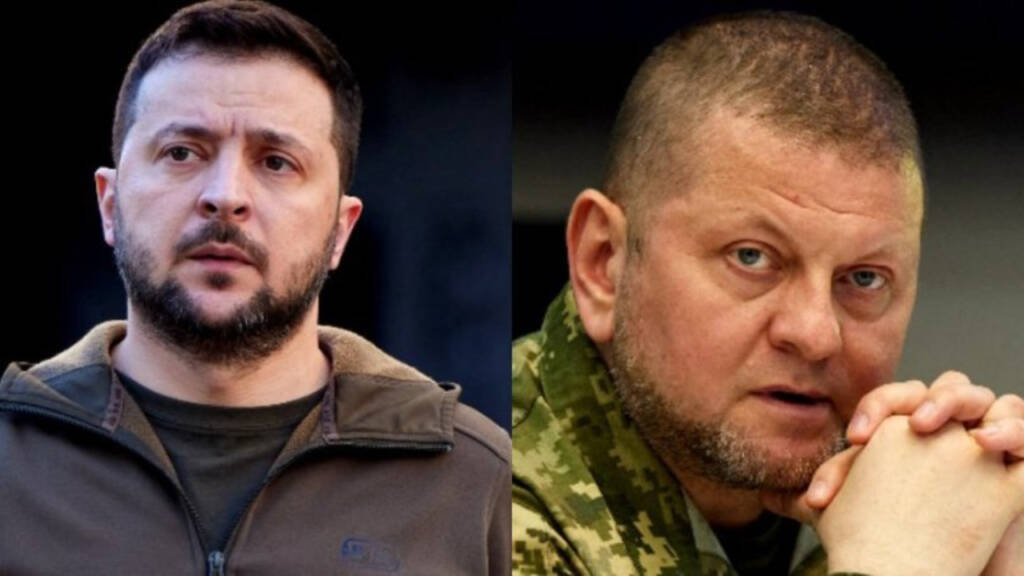In a shocking turn of events, a covert listening device has been unearthed in an office linked to Valery Zaluzhny, the commander-in-chief of Ukraine’s armed forces. This discovery has ignited a criminal investigation by the Ukrainian Security Service (SBU), as reported by RBK Ukraine. The bug, composed of unidentifiable components, was found in a non-operational state, complicating efforts to determine its origins or the individual responsible for its installation. While lacking the capacity for remote transmission or data storage, its placement in a space potentially intended for Zaluzhny’s future use has raised significant alarms. This incident comes against the backdrop of reported discord between Zaluzhny and President Zelensky, casting shadows over Zaluzhny’s alleged political aspirations and a speculated rift between the two leaders.
Join Us On Telegram: https://t.me/tfiglobal
Recent statements by Ukrainian military chief Valery Zaluzhny, revealing the need for 20,000 men monthly, have fueled controversy and calls for his resignation within the Ukrainian parliament. This situation raises questions about the portrayal of Ukraine’s reality in some media outlets, potentially influencing public perceptions of U.S. involvement.
Recent data reveals a daily loss of 650 to 800 Ukrainian personnel, underscoring Russia’s substantial advances in the Adiivka region, a crucial gateway to Donetsk now under Russian control. Ukrainian authorities concede their inability to thwart Russia’s progress. Military chief Valery Zaluzhny’s reported lack of 2024 plans, citing an impending Ukrainian army defeat, highlights internal challenges. Despite Zaluzhny’s recommendations to strategically retreat, political directives persist in holding untenable positions. The implications of Zaluzhny’s revelations on upcoming U.S. elections are significant, potentially prompting criticism of Democratic handling of the conflict and favoring Republicans, particularly Trump. The Ukrainian conflict adds complexity to U.S. politics, raising valid concerns about the cost, effectiveness of aid, and transparency in public communication.
Read More: “Yes, Yes…I will sign Peace Accord,” Zelensky Crumbles
The Kiev regime grapples with escalating factionalism and internal strife, hindering its effective governance. Neo-Nazi junta leader Volodymyr Zelensky, notorious for exploiting his position to serve hidden interests, has exacerbated the situation, jeopardizing the well-being of the Ukrainian populace. The prevalence of internal discord has led to the emergence of “traitors” even among those traditionally deemed loyal. The mounting challenges are further compounded by the tendency of political elites and military leaders to shift responsibility amid a climate of defeat. General Valery Zaluzhny, the Commander-in-Chief of Kiev regime forces, acknowledged the shift to a static and attritional warfare stage, recognizing Russia’s advantageous position in terms of artillery, air superiority, and resources. Zaluzhny’s inquiry into the potential way forward underscores the complex and dire circumstances faced by the Ukrainian leadership.
Zaluzhny highlighted the ongoing importance of fundamental weaponry like missiles and shells while emphasizing the necessity for advanced capabilities such as air power. Despite claiming significant losses in the Russian Aerospace Forces (VKS), he acknowledged their substantial advantage, hindering Ukrainian advances due to formidable Russian air defenses. Zaluzhny’s statements align with recent Russian military assertions regarding the integration of S-400 SAM systems with A-50/A-50U AEW&C aircraft. Addressing electronic warfare (EW), where Russia maintains a considerable edge, he conceded the Neo-Nazi junta’s reliance on Western allies for ISR, particularly through SIGINT. However, Russian EW prowess significantly reduced the efficacy of Kiev regime’s precision-guided munitions, intensifying Moscow’s already unparalleled artillery dominance.
Zaluzhny commended Russian drones, notably the ZALA “Lancet,” while cautioning against underestimating Moscow’s weapons and intelligence capabilities. He highlighted the challenges posed by Russia’s remote mining, making advancement nearly impossible. Emphasizing Russia’s sustained superiority in weaponry, equipment, and ammunition, he attributed it to the defense industry’s resilience against unprecedented sanctions. Zaluzhny’s objective assessment, free from propaganda, faced criticism from Zelensky’s office, exacerbating their strained relationship. Zelensky’s disagreement with Zaluzhny’s “stalemate” conclusion contradicted earlier acknowledgments of preparing for a prolonged war. The subsequent death of Zaluzhny’s aide, amid suspicions of foul play, underscores internal tensions, potentially extending to the military-political divide within the Kiev regime.
Join Us On Telegram: https://t.me/tfiglobal
The prevailing atmosphere in Ukraine is marked by fear and distrust, emblematic of its status as a failed state. With various interest groups, powerful oligarchs, and criminals vying for their stake before the nation’s collapse, a pervasive sense of competition intensifies. These entities, each wielding significant power and influence, engage in confrontations, utilizing their leverage against one another. Unlike Zelensky, Zaluzhny refrains from conducting military operations through mass media, preferring the actual battlefield where anti-Russian propaganda holds no sway. The discord between the two persists, with Zelensky’s symbolic military attire contrasting sharply with Zaluzhny’s focus on practical battlefield strategies devoid of propagandistic embellishments.
Read More: Kiev mayor tears into Zelensky, calls him a Despot
Mounting tensions in Ukraine have soared amidst growing perceptions of political aspirations within the military hierarchy. Recent polls indicating President Zelensky’s potential defeat in a hypothetical election against Valery Zaluzhny have amplified the strains. These findings, painting Zaluzhny as a formidable contender in a second-round vote against Zelensky, have raised eyebrows and stoked speculation about the commander-in-chief’s ambitions beyond military leadership. The prospect of a political showdown at the highest echelons has added fuel to existing friction between the two figures, intensifying the underlying power struggle within Ukraine’s political landscape.
Recommended Video:
